- HOME >
- NEWS >
- Josai Hosts Modern Poetry International Symposium “Poetry and Childhood” and Announces Creation of Kiro Award for Exchange Students


On July 1, 2016, the Josai University Educational Corporation (Noriko Mizuta, Chancellor) hosted the Modern Poetry International Symposium “Poetry and Childhood” in the Building 1 lecture hall on Josai’s Tokyo Kioicho campus. The event, which featured a keynote lecture by Professor Gao Xudong of Renmin University in China on Lu Xun, and readings and discussions by contemporary Japanese and Chinese poets, drew around 160 people, including poets, scholars, faculty and students. As a result, one can expect further strengthening of the research network between Japan and China, and a wealth of practical knowledge to be gained through this relationship.
In December2015, to commemorate its 50th anniversary, Josai University opened the International Modern Poetry Center. Since then, Josai has signed exchange agreements with Peking University’s poetry department, with Beijing Normal University and with Capital Normal University to develop research in the field of modern poetry. Furthermore, in March 2016, Josai opened a Modern Poetry Center office on Peking University’s campus; the first Japanese research facility being opened on Chinese university grounds. The objective was to deepen the field of poetry studies between the two nations.
The symposium opened with introductory remarks by Chancellor Mizuta, who served as MC for the event: “Thanks to our relationship with Peking University, we are pleased to present a keynote lecture on Lu Xun by Professor Gao. Lu Xun was a very significant literary figure during the process of modernization who linked the countries of Japan and China, and who is thus a highly appropriate subject for today’s symposium. The symposium focuses on the significance of childhood for the poets in question, but I would also like to use the opportunity to think about the relationship between childhood and poetic expression for these poets of different generations and experiences, who have witnessed the changing relationship between Japan and China.”
Chancellor Mizuta’s words were followed by Professor Gao’s lecture on “Lu Xun―Japanese Relations in His Debut Novel”, as well as a roundtable discussion and readings in the afternoon session. Chinese participants included Mr. Yang Ke, Mr. Liang Xiaoming, Mr. Shu Cai, Mr. Hua Qing, Ms. Cong Rang, and Professor Tian Yuan from Josai International University. Japanese participants consisted of Mr. Koji Usami, Mr. Shin Takeuchi, Mr. Ken Niinobe, Mr. Kiwao Nomura, Ms. Mizuki Misumi, and Josai chancellor and poet Noriko Mizuta.
|
Chancellor Mizuta makes |
Professor Gao delivers |
Roundtable discussion participants included Mr. Yang, Mr. Niinobe, Mr. Hua, Mr. Nomura, and Chancellor Mizuta, with Professor Tian serving as chair. During the discussion, Chancellor Mizuta stated that, “Childhood serves as an important source not just for poetry, but also for other literary works. Landscape and photography are also important keywords in communicating a sense of one’s childhood.” Mr. Yang reflected on his own youth by saying, “During my childhood, I first became familiar with Tang poetry, partially under the influence of my parents. It wasn’t until the 1980s, when foreign poetry was first translated, that I was able to study foreign verse as well.” Mr. Niinobe commented that, “Through the magic of poetry, one is able to return to the days of childhood,” Mr. Hua stated that, “Poetry is an expression of our will, communicating human desire through lyricism and inquiry.” Mr. Nomura then commented, “When listening to the Chinese poets, I’m struck by the resemblance of notions of “poetry” and “death,” which leads me to wonder if one’s youth and the conclusion of life aren’t one and the same.” Professor Tian also remarked, “For any poet, childhood is the foundation of composition, besides having a large influence on character formation.”
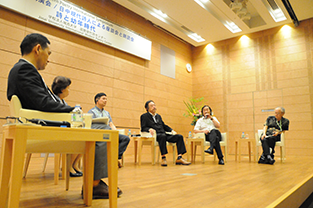
The roundtable discussion in progress
The discussion was followed by recitations by Mr. Liang, Mr. Shu, Ms. Cong, Mr. Takeuchi, Mr. Usami, and Ms. Misumi. Each of the six gave short speeches on the subject of “Poetry and childhood” with all twelve participants contributing verses, including poems related to the day’s topic. Prof. Tian also contributed, reciting from memory a poem of Chancellor Mizuta and improvising his own quatrain.
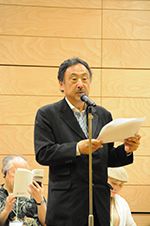
Mr. Niinobe gives his reading
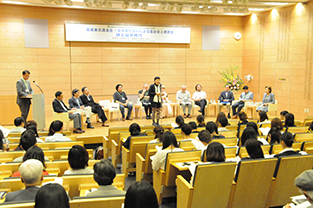
Ms. Misumi reads during the recitation portion
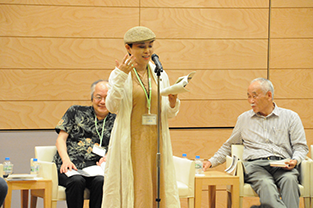
Ms. Cong gives her reading
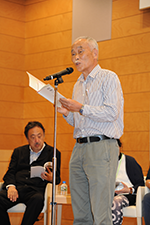
Mr. Takeuchi during
his reading
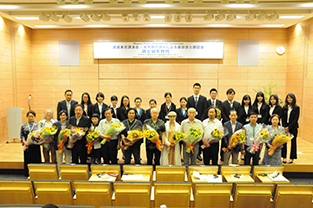
Receiving bouquets from exchange students
In conjunction with this year’s symposium, a special exhibition of ink paintings by Chinese calligrapher and artist Zhang Xiaoshen was held at the Mizuta Museum of Art, from the 1st of July to the 4th of July, in Building 3 of Josai’s Tokyo Kioicho campus.
Mr. Zhang Xiaoshen was born in 1958. Fascinated by ink, he possesses a unique personal history which prompted him to take up the brush after the age of 50. His works are known for the piercing quality of the ink, combined with an abstract perspective, and are sought after by both numerous international art museums and private collectors. Josai received much support from Peking University’s Poetry Department when the Modern Poetry Center opened, including donations to this symposium.
This exhibition featured twenty paintings, including some by Japanese poet Shuntaro Tanikawa. At the opening ceremony which preceded the exhibition, Chancellor Mizuta greeted the audience by saying, “The ink wash paintings in this exhibition all aim for an avant-garde spirit which transcends the traditional, something which is very fitting for this event, and which I feel will make for a personally memorable exhibition.” Mr. Zhang responded by saying, “I’m very thankful for the creation of a space which actualizes my true ideals. Thanks to all of your support, this exhibition is sure to be a motivating force in my next creative endeavor.”
Josai University President Yasunori Morimoto, Mr. Zhang, and others were joined by artist Hiroshi Noda for the ribbon cutting to celebrate the opening of the exhibition.
|
Ribbon Cutting for the Zhang Xiaoshen Exhibition |
Mr. Zhang explaining the artwork |
During introductory remarks at the opening of the International Modern Poetry Symposium, Chancellor Mizuta announced the creation of the Kiro Award, a poetry award aimed at exchange students studying in Japan.
The award was established with funds donated by the Josai-Dalian/Shenyang Alumni Association to honor Josai’s 50th anniversary. The name for the award was taken from the title of Chancellor Mizuta’s poetry collection. It was established to encourage the submission of works of poetry which contain ideas produced through contact with foreign cultures and the pursuit of different types of knowledge. We invite fresh and unique submissions of all kinds. Please see the details below:
| Sponsor: | Josai University Educational Corporation, International Modern Poetry Center |
| Support: | Shichosha |
| Additional support: | Mainchi Shimbun, Japan Times |
| Judges: | Toru Kitagawa (poet), Mutsuo Takahashi (poet), Kiwao Nomura (poet), Toshiko Hirata (poet), Noriko Mizuta (poet, scholar of comparative literature), Tian Yuan (poet, translator) |
| Object: | Contemporary poetry (written in Japanese) |
| Eligibility: | International students (college/high school), regardless of age |
| Submission requirements: | Original, unpublished composition |
| Deadline: | November 30, 2016 (postmark) |
| Must include: | address, name (in case of penname, also include legal name), age, gender, phone number, e-mail address, nationality, brief resume Submissions must be printed on A4 sized paper. Originals will not be returned. |
| Address submissions to: | Josai University/Josai International University Kiro Award Committee Kioicho 3-26 Chiyoda-ku, Tokyo 102-0094 |
| Results Announcement: | End of January 2017, via website. Winners will be published in the journal Gendaishi Techo and an award ceremony will be held in February 2017 (planned). |
| Award: | Grand Prize (1): 300,000 yen Runners Up (3): 30,000 yen |
| Contact: | International Modern Poetry Center Josai University Educational Corp., Kioicho campus Building 3 Hirakawa-cho 2-3-20 Chiyoda-ku, Tokyo 102-0093 Email: kiro@jiu.ac.jp |
